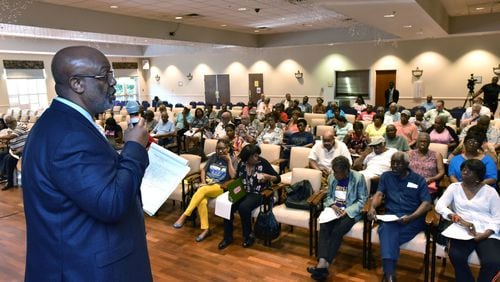The Fulton County government has been accused of matching thousands of new home buyers’ property values to the prices they paid for their houses, while leaving their neighbors’ values alone.
The result is a tax base that has large discrepancies in property values between similar homes in the same neighborhood, an attorney said, and threatens the requirement that property be valued uniformly across a neighborhood and throughout the county. A member of the county's board of assessors said the county, school boards and cities could be on the hook for as much as $36 million in refunds.
"We work for the public, and we did something wrong," said R.J. Morris, a member of the Fulton County Board of Assessors. "If we're targeting individuals, it's completely oxymoronic to the word uniform."
For years, Fulton County failed to keep up with rising property values following the recession. In 2016, homeowners in Cobb, Gwinnett, Clayton and DeKalb counties saw 7 to 11 percent increases, while those in Fulton were on average only 2.6 percent higher. That year, the former chief apparaiser told The Atlanta Journal-Constitution he planned door-to-door assessments beginning in 2017 that would bring values up.
Mitchell Graham, a property tax attorney, contends the appraiser’s office started increasing values earlier, but only for new homeowners. On Thursday, he filed suit in Fulton County Superior Court on behalf of Adam Rice and Devika Kumar. In the suit, which he hopes will become a class action, Graham said Rice and Kumar’s Baylor Street home in Atlanta was valued at $189,900 before they bought it, in 2015. In 2016, their value had jumped to $290,000, which was also their sales price. Neighbors’ properties were not similarly raised, Graham said.
“It’s really a fundamental agreement between taxpayers and the government, that they assess legally, fairly and consistently,” Graham said. “You start to see a real breakdown of trust.”
Morris estimated that more than 18,000 Fulton residents bought new homes in 2015, and had their values raised to their sales prices in 2016. Because the county froze 2017 values at 2016 levels after residents complained about huge jumps in their values, he said the impact from the 2016 decision was doubled.
Dwight Robinson, Fulton's chief appraiser, said his department intends to study whether Morris' estimates are correct. He said the practice is not illegal if homes in each neighborhood are between 90 and 110 percent of their fair market value, though placing values at a previous year's sales price is frowned upon.
Robinson said residents who think they were unfairly valued have always had the right to appeal.
That’s what Sarah Margulies did, after moving to Howell Station on Atlanta’s west side in 2015. She paid $285,000 for her house, which had been valued at $206,100. When she got her 2016 property value, it was the same as her purchase price.
Margulies appealed, saying her house — which was built in 2004 — was being unfairly compared to new construction. Neighbors whose homes were built at the same time as hers, but who had lived there longer, largely saw their values remain static, she said.
Her appeal was rejected, and Graham took her case to court, where she eventually settled with the county, reducing her value to $235,500. Graham, who lives in Margulies’ neighborhood, said his 2016 value was also the same as his 2015 purchase price, though his appeal was successful.
“It’s really frustrating to know the county did this,” Margulies said. “The system should work for the residents, and not against them.”
Morris, the member of the board of assessors, conducted his own analysis of 2015 sales and 2016 values. He estimated that the move could have overcharged residents between $15 million and $18 million each year in county, city and school taxes. Morris also said the state Department of Revenue should have caught the action.
A spokesperson for the department said in an email that it's the responsibility of the county's board of assessors to assess properties "in accordance with the law."
Fulton has nearly 320,000 residential parcels; the 18,000 that would be affected represent about 5 percent of the total residential property. But Graham said after the Department of Revenue rejected Fulton's 2017 tax digest, his suit could trigger a new look at the 2016 digest, too.
If it does, Morris said, it’s warranted.
“They basically stole money,” he said.
What’s the problem with saying a house is worth what someone paid for it?
Nothing, really. State law says that a home cannot be valued for more than what it was sold for in its first assessment after a sale.
But the problem comes when one home in a neighborhood is raised to the sales price, while values don’t change for other homes in the same neighborhood. That’s what an attorney says happened for his client, and could be the case for more than 18,000 Fulton County residents.
If that’s the case, it could mean that new homeowners were paying more in property taxes than their neighbors who had lived there longer.
About the Author








